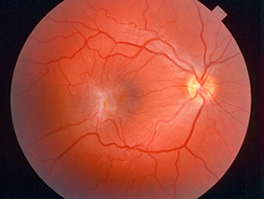
Epiretinal membrane, also known as macular pucker, is a disease caused by the superficial folding of the central retina or macula by a thin fibrous membrane in the back of the eye. This wrinkling of the retina can be caused by:
- Vitreous detachment (especially common in older generations)
- Traumatic ocular injury or inflammation
- Ocular blood vessel abnormalities like retinal vein occlusion
- Retinal detachment or retinal tearing

An epiretinal membrane is also called cellophane retinopathy, because the membrane structure resembles cellophane or plastic wrap. The deformation of the normally smooth macula will cause distortions in vision that can greatly limit a person’s ability to function in daily life. Central blind spots and cloudy vision may also develop as a result of progressed epiretinal membrane or macular pucker.
The mildest cases of epiretinal membrane do not require treatment at all. The only treatment for a severe epiretinal membrane is a surgical procedure called vitrectomy, in which the vitreous humor is removed from the eye followed by removal of the scar tissue. This allows the macula to flatten out into a more normal configuration.



